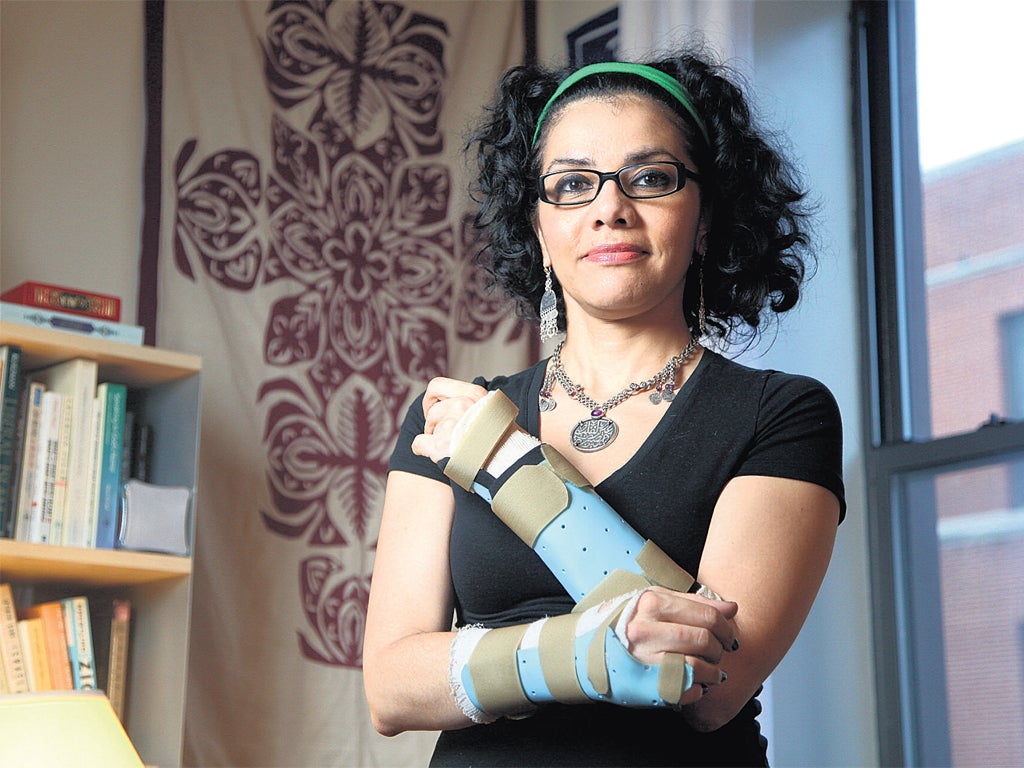
Your support helps us to tell the story
From reproductive rights to climate change to Big Tech, The Independent is on the ground when the story is developing. Whether it's investigating the financials of Elon Musk's pro-Trump PAC or producing our latest documentary, 'The A Word', which shines a light on the American women fighting for reproductive rights, we know how important it is to parse out the facts from the messaging.
At such a critical moment in US history, we need reporters on the ground. Your donation allows us to keep sending journalists to speak to both sides of the story.
The Independent is trusted by Americans across the entire political spectrum. And unlike many other quality news outlets, we choose not to lock Americans out of our reporting and analysis with paywalls. We believe quality journalism should be available to everyone, paid for by those who can afford it.
Your support makes all the difference.The scars on Mona Eltahawy's forearms have faded to thin white slivers. Six months ago, the journalist and outspoken supporter of the revolution was brutally beaten and sexually assaulted by Egyptian police in a side-street off Tahrir Square. They targeted her arms, her hands. "I thought it was a random attack, but human rights activists told me they knew exactly what they were doing," she says.
We meet soon after the publication of her article for Foreign Policy magazine, entitled "Why do they hate us?", which paints an uncompromising picture of misogyny in the Middle East. Hatred of women, Ms Eltahawy writes, runs like a dark thread through the politics of the Arab world, from driving bans in Saudi Arabia to sexual violence, child marriage and female genital mutilation in Egypt, Afghanistan, Sudan.
To call the piece controversial would be an understatement. Feminists and radicals have joined the anticipated chorus of disapproval from conservative Muslims, decrying the piece as simplistic, neo-colonialist, offensive to Muslim women and damaging to the Arab Spring.
Many of those responses, however, chose not to mention Ms Eltahawy's assault. "I'm really p****d off," she says. "I was at the receiving end of a beating and a sexual assault, so when I talk about misogyny and hatred of women, I've experienced it personally on my body.
"I know I wrote the piece with rage, but I feel it's a justified rage," she says. "Instead of challenging my facts, the reaction has been: 'How dare you make us look bad?'"
There is arrogance here, certainly, and fierce pride – and you can't help wonder if the same pride would come in for as much condemnation from a male radical journalist.
We meet in a little restaurant in Harlem, New York, where Ms Eltahawy, 44, now lives, after a brief marriage to an American in 2000. Ms Eltahawy grew up in Egypt, London and Saudi Arabia, and has been working as a journalist in the Middle East since she was 21. She was hailed as a hero after her assault, but condemned as an "Uncle Tom" after she blamed misogyny, not just state oppression, for her attack.
The public seems to be more comfortable with her being the dignified victim of sexual violence than the loud survivor, using 10 newly-healed fingers to "poke the painful places" of "the misogynistic structure of our society".
"A lot of people have looked at my essay and said, well, you've made Arab women seem like helpless victims. I haven't done that," she says, adding: "The region is going through an incredibly exciting time, and if we don't have this conversation as it's happening, then once again women will lose."
Join our commenting forum
Join thought-provoking conversations, follow other Independent readers and see their replies
Comments